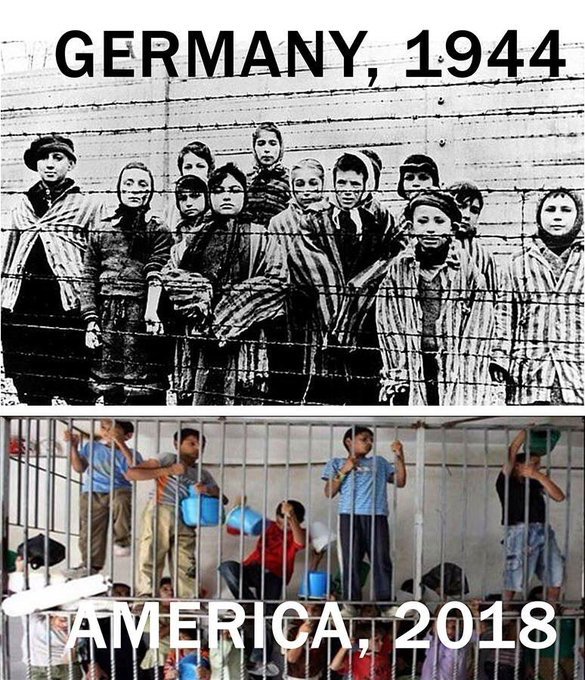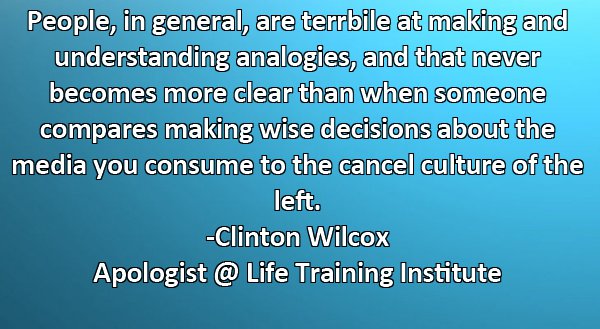I’m a “nerd.” You guys have figured that out by now. One of my nerdy habits is enjoying the Mandalorian with my family, as — thankfully — they, too, are “nerdy.” The show recently wrapped up its second season on Disney +, and if you visit my household, you can tell we are fans. My children each have 2 types of Baby Yodas, a character now revealed to be named Grogu, but I have a large one myself, that sets on top of the bookcases in our living room. My children have lightsabers and action figures, and I, too, have a Mando and Baby Yoda to put up on the shelves. Sadly, due to recent real-world events, I find the Mandalorian to be tainted, and I may not be tuning in to Season 3. To explain why I might be “canceling” something despite disliking cancel culture, there is a bit of a backstory.
I’ve divided this article into two parts, in case you want to skip to the more general application rather than the specifics that prompted my dilemma.
The Backstory
I grew attached to the show in part because I grew up enjoying the original trilogy of movies, but also because after checking out the first episode, it had obvious themes of fatherhood. The main character is a bounty hunter, and the story begins with him sent to retrieve a target, and he is stunned to find that it is an innocent child. The Mandalorian, Din, Djarin, adopts “the child” and begins to protect him at great personal cost. I thought it was a heartfelt and unusual message in our culture, which often minimizes the impact of fathers. Unfortunately, culture eventually had it out for the show, or at least one of the actors involved.
The Mandalorian ends up meeting a formidable alley named Cara Dune, played by former MMA fighter Gina Carano. She has a protective, mama bear-like relationship with the child. She quickly became a fan favorite, even though she wasn’t on every episode. She had physical strength, was independent and yet still had feminine characteristics — a hard balance to pull off. Unfortunately, she didn’t share the same worldview as others.
We live in what’s called “cancel culture.” Now it’s not enough to agree to disagree, but if you don’t follow certain social ideas. then folks will cry out for you to be “canceled” which means fired, deplatformed (banned from social media), and, Ideally, blacklisted (un-hirable). It’s an eerie reversal of McCarthyism, where the government caused those in Hollywood with left-leaning political viewpoints to be blacklisted.
When Gina was encouraged to list her pronouns on twitter, she initially declined. She eventually included “Beep, bop, boop.” She explained later that this was because she didn’t like being told what to do and did not mean it as an attack on the transgender community. They were welcome to put whatever pronouns they liked; she just didn’t want to be forced to put in her own.
To understand this, you would need to know that in many spheres of our culture, gender is viewed as separate from biological sex and includes an individual’s preferred pronouns. Many think that you need to ask or be told what someone’s gender is and their desired pronouns, so that you respect their identity. This isn’t how this has been done historically, including in English. Science demonstrates we are a two-sex species with only two types of sex cells. Those experiencing gender dysphoria are experiencing something, and we should love them, but every single cell in a human being embodies their gender, with only extremely rare examples of genetic defects. While the Bible confirms this (Mark 10:6), we don’t even have to bring it up and can look at science to address the issue.
From the moment she wrote “Beep, bop, boop,” Gina Carano became a target. The hashtag “#fireginacarano” trended on Twitter multiple times. Every tweet or social post she made was heavily scrutinized. Some of her other “controversial” posts showed her support for constitutionally recognized rights and concerns of government abuse, calls to work together for voter reform and other posts deemed “conservative.”
Meanwhile, her co-star, the actor who portrayed the titular Mandalorian, Pedro Pascal, had his own Twitter issues. I’m going to share just two of them, to provide context to the tweet that received the harshest backlash from Gina Carano.
Pascal tweeted a picture of two sets of children behind bars, one was labeled Germany 1944, the other wasn’t labeled, but he wrote “#thisisamerica.”

The problem was that it was not in the U.S. at all, nor where the children detained. The photo was from a soup kitchen in Israel where Palestinian children were waiting for free food. He tweeted this as an attack on who was president at the time. I, too, share a desire to see our immigration situation improve, but not only was the meme inaccurate, it misrepresents which president started the procedure, and why, which, among other things, was to help screen for sex trafficking. That is a pressing issue, with the number of minors at the border having tripled during in the past few months. I don’t want to digress further on this topic, other than requesting you pray for the situation, but I did want to show that he compared America to Nazi Germany.
That wasn’t the only time Pascal compared at least some Americans to Nazi Germany. I also tweeted an image comparing supporters of our former president to the confederate states of America and the Nazi’s. I understand differing viewpoints, but I think we need to be wise about how we hope to win others over to our view, and hopefully that is our desire if we think we are right. There is a reason Proverbs 16:24 reminds us “Gracious words are like a honeycomb.” By attacking a large group of his own audience Pascal may have risked hurting himself, but it was acceptable for his crowd and nothing came of it. I only bring this up, because of how directly it relates to the tweet that spelled the end for Carano.
Before I share what was deemed “The last straw” for Carano, I want to say that I think it was in poor taste and was not a fair comparison. I understood her point, but think it could have been made better. She retweeted an image with of a woman being attacked in the streets with the caption, “Jews were beaten in the streets, not by Nazi soldiers but by their neighbors… even by children.… Because history is edited, most people today don’t realize that to get to the point where Nazi soldiers could easily round up thousands of Jews, the government first made their own neighbors hate them simply for being Jews. How is that any different from hating someone for their political views.”
This post was viewed as anti-Semitic and offensive. Many claimed by comparing the Jewish holocaust with modern day issues she was belittling the trauma they endured. I think this misses her point. She wasn’t bringing up the Holocaust itself as a point of comparison, but how, in the time leading up to it, people were intentionally and intensely divided. She clearly thought it was a serious ordeal, as her point hinges on wanting to avoid repeating it.
I think it’s important to note that there is an obvious difference between holding a political view and someone’s race.
It’s important to note that she didn’t name either of the major American political parties or herself, even though it was automatically interpreted as being one-sided and painting herself as a victim. It’s also self-apparent that the U.S. is at a critical point in our history. We had riots across the country last year and a break-in of the Capitol Building this year. We have gone beyond just a strong disagreement, and strong hatred between opposing views is furthering the divide and lowering the level of discourse.
With the #fireginacarano hashtag trending again, frequently political entertainment site Io9 obtained the following statement from Lucasfilm: “Gina Carano is not currently employed by Lucasfilm and there are no plans for her to be in the future. Nevertheless, her social media posts denigrating people based on their cultural and religious identities are abhorrent and unacceptable.” It’s hard to get past their comments without noting it is flatly libel. Her post was not denigrating people and especially not for their cultural and religious identities. It was as if Lucasfilm borrowed a Jedi mind trick from their own fiction, waved their hands in front of the masses, and they obeyed. Many celebrated her firing, and quickly moved on to calling for the canceling of another Star Wars actress, Rosario Dawson, based not on her comments or tweets, but on a legal issue with some members of her immediate family being sued for “purposely misgendering” (that is calling someone by their biological sex, not their identified gender).
So Carano was let go over the tweet. Technically, her contract was not renewed, but the result was the same, and the reason Is clear. She has since opened up about her time with Disney. She was made to talk to social media handlers, speak with lawyers and sensitivity trainers, and was forced to apologize for tweets. She reported feeling bullied by the company and pushed to conform.
While one incident is troubling, the uneven application is more troubling. Had Pascal not also compared the current political climate to Nazi Germany? Even more so? Why then was he given a pass? The difference is their personal politics, and it speaks volumes.
Beyond comments from individuals employed by Disney, I had long been wrestling with a more important issue. There is a connection which helped sway me. If Disney was truly outraged by comparison to the Jewish people’s plight in Nazi Germany, should it not be even more outraged at actual human rights violations occurring in the world today? Why work with Communist China and thank people by name in the credits of the recent live-action film, Mulan, who are responsible for forced internment camps, forced sterilization and what many are calling genocide? It’s far closer to what happened in Germany.

If you think I’m making too much of the situation, especially since our current president chalked it up to “cultural differences” (https://nypost.com/2021/02/17/biden-says-uighur-genocide-is-part-of-chinas-different-norms/) you can read more about the camps here: https://thefederalist.com/2021/01/19/us-becomes-first-nation-to-designate-communist-chinas-treatment-of-uighurs-as-genocide/ It was already hard for me to support Disney knowing they were willing to thank people directly over seeing the camps where women were forcibly sterilized, but the more I read the more heartbroken I became. China has also lead Disney to censor people of color as well (https://www.digitaltrends.com/movies/star-wars-john-boyega-chinese-poster/) They have a bigger say in global entertainment, now, due to their box office, and our culture is switching gears to do better financially overseas. It seems they are only outraged about race or justice issues when it is convenient for them.
With that hypocrisy in mind, I decided enough was enough. Moral outraged was only being directed at those with conservative views, and so I canceled my Disney + subscription, and I still feel I should have done so over the Mulan movie and the friendliness to China and their ongoing grievous abuse of minorities instead of waiting for something more personal and closer to home. It may not be forever, as I do hope there will be some change on Disney’s end.
Can we cancel something in cancel culture?
I recently shared from the pulpit that a pastor-friend shared the idea that it was Christians who invented cancel culture. When we were the moral majority and the culture was beginning to turn away, we would call for boycotts of companies, which served as a precursor to “canceling” them. It was also possible for individuals to be canceled or blacklisted because of their views.
I was canceled. Because my first wife left me in pursuit of another man, despite not having sinned myself, I was deemed unfit for service in various roles in the Southern Baptist world. I was publicly snubbed and whispered about. It was heartbreaking.
As folks responded to #fireginacarano with #canceldisneyplus, many wondered if it was only the cycle continuing. If we all cancel each other, who will be left? I thought there was wisdom in the push back, but also nuance in the ways we could approach the situation, so I took to Scripture to weigh things out.
The church itself has the right to discipline its members (Matthew 18:15-17), which does include expulsion (1 Corinthians 5:13.) Society also has a means to deal with individuals (Romans 13), but these are for serious matters. We are also to avoid divisive people (Romans 16:17), and that implies that we shouldn’t be divisive ourselves. Our enemies aren’t people (Ephesians 6:12), but we should also remember 2 Corinthians 6:14: “Do not be mismatched with unbelievers; for what do righteousness and lawlessness share together, or what does light have in common with darkness?”
I think the disconnect from the old “boycott” movements and the current cancel culture is that we have confused businesses or products with people. The current cancel culture doesn’t want to “vote with their dollars” but instead, destroy people and prevent others from enjoying their work.
Society is right to notice that real objective wrongs exist in the world, and I do not expect anyone to be able to perfectly navigate relationships in this complex web of interconnected people, because all are broken (Romans 3:23). The selective outrage is what troubles me. Many call it “accountability culture” rather than cancel culture, and think justice has been done, but I think they misunderstand what justice is. Unequally applied justice is not justice at all.

I am thankful for grace, undeserved favor, freely offered to all, and I much prefer that to justice. Living in this world, however, I must be a good steward of my finances, and I do feel an obligation to “vote with my dollar” and at least for me, I have chosen to cancel a subscription, but not a person, in hopes of sending a message to a corporation who is having massive cultural impact on our society, and being complicit in deep moral wrongs, while silencing dissenters when convenient.
Matthew 6:24 says we cannot “have two masters” and I worry about embolden employers who may want one day to silence us from spreading the Gospel, even in our off hours. You are free to make your own decisions on such matters, but we are not free to continue hate to the individuals. So as I finished writing the article I took the opportunity to pray. I prayed for those who approved of the work with concentration camps in China, approved thanking them in the credits, those who spread division in the workforce over world view disagreements, and those who hold bad views that kept them from truth, as well as the victims of cancel culture. I did this because I see those in the cancel mob as victims, too — victims of the bad idea that conformity will somehow lead to peace, contentment, and progress while missing that it matters what ideas we all confirm to — and the reality that ideas are not all equal.
